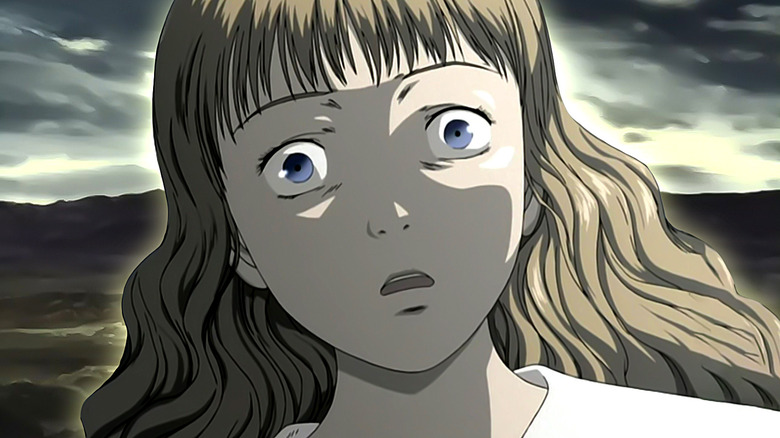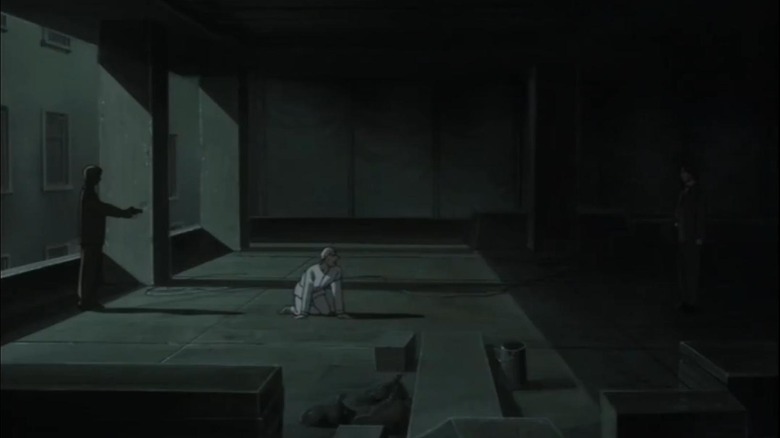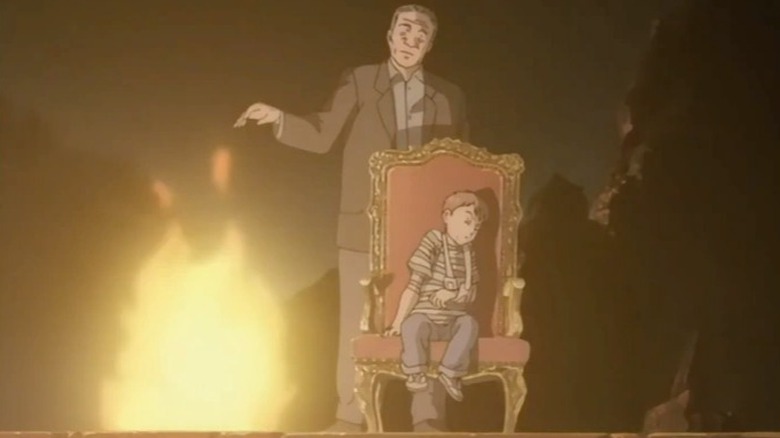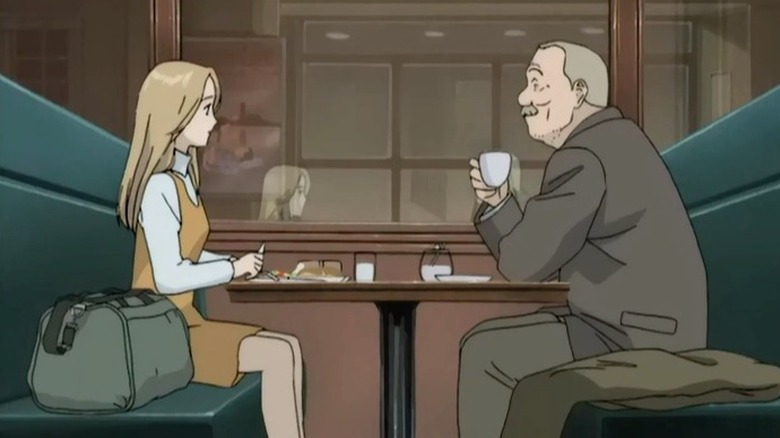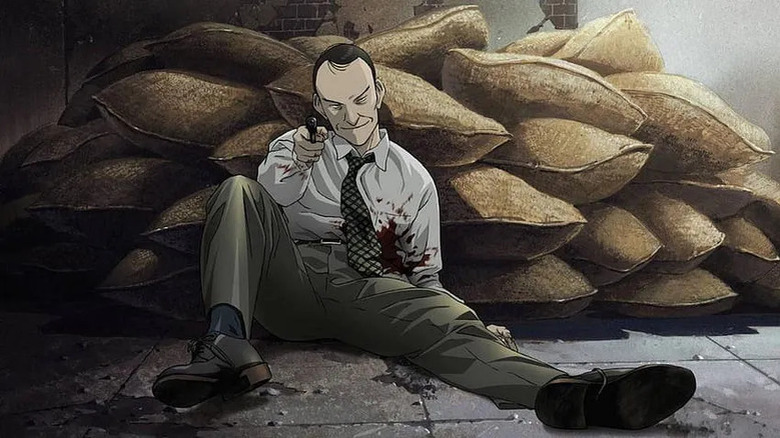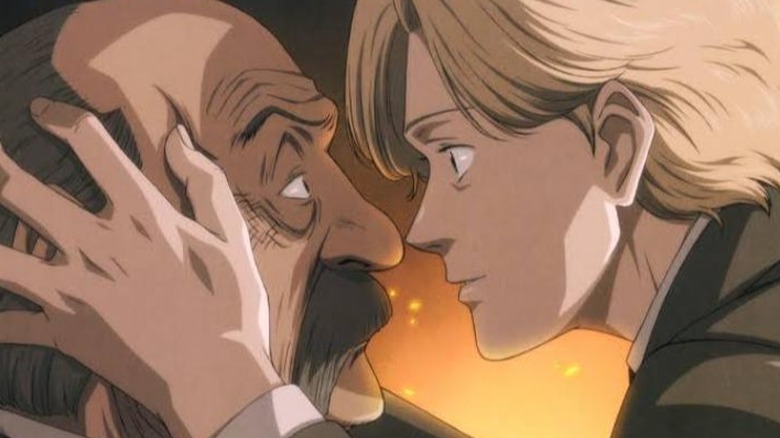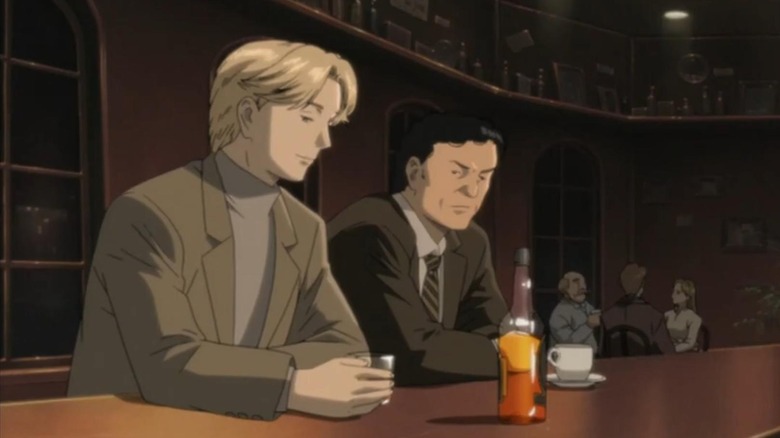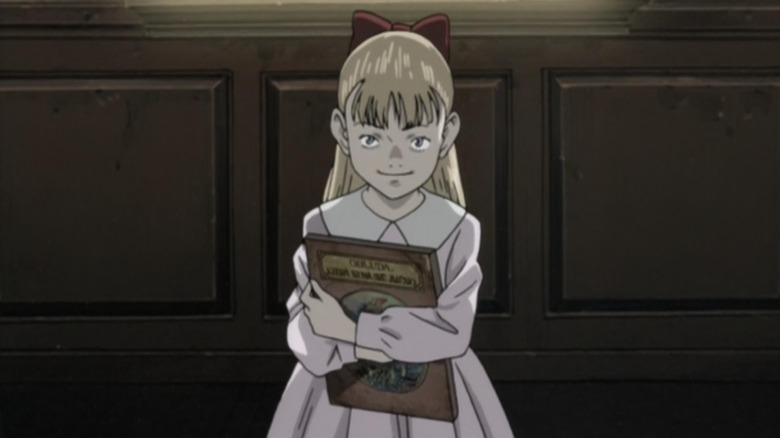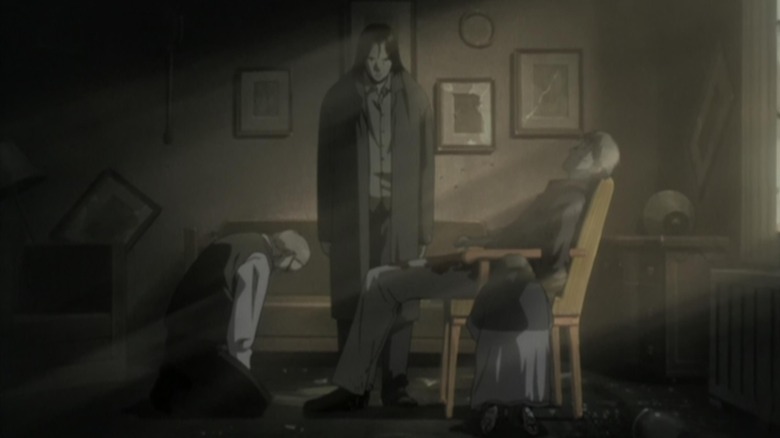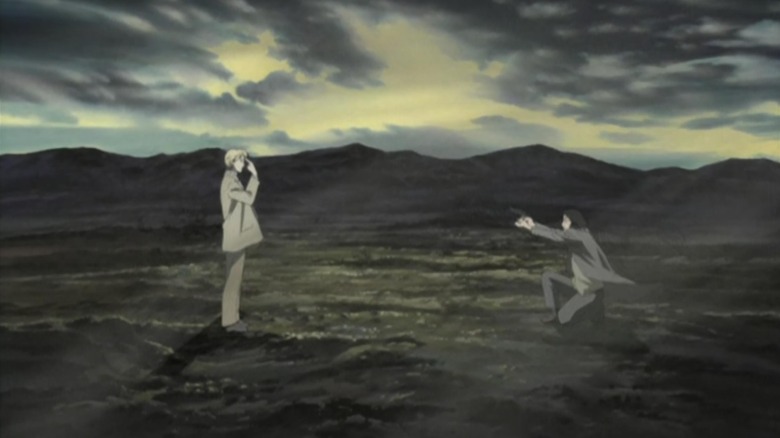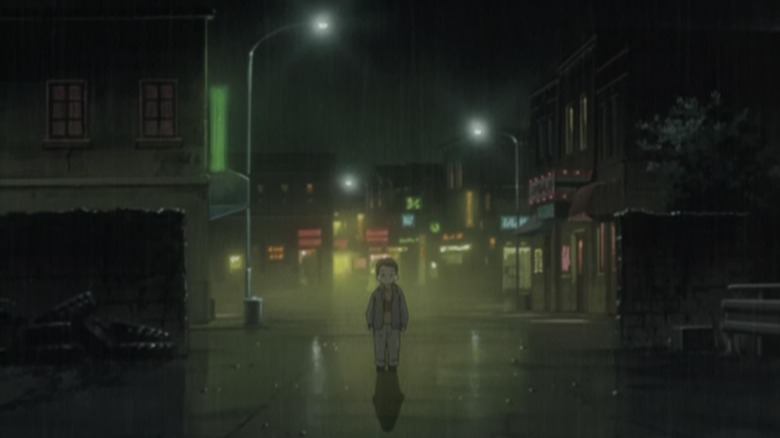The 10 Best Episodes Of The Monster Anime Series, Ranked
For the anime uninitiated, "gritty cat-and-mouse thriller about a serial killer" probably doesn't sound like what you'd imagine. Yet, that's exactly the premise of one of the best works produced in the medium: "Monster," the 74-episode anime adapted from Naoki Urasawa's manga.
Inspired by the original "The Fugitive" television series with a European twist, "Monster" follows Dr. Kenzo Tenma. Many years ago, he saved the life of a young boy named Johan Liebert. Now, the doctor has been framed for murders committed by Johan, so he hunts Johan across Germany while dodging the cops. Tenma is not out to prove his innocence or bring Johan to justice, though. He wants to fix the mistake he made by reviving a monster.
The "Monster" anime is basically a shot for shot adaptation, but it colors in Urasawa's realistic Osamu Tezuka-flavored art-style with stellar music and voice-acting. The title sequence, "Grain," is a perfect mood-setter. The 90-second opening shows Tenma, always looking over his shoulder, chasing after something through the streets of Europe. You may not know what he's looking for, but the music (which mixes a slow guitar strum with eerie soprano hymns) and flashes of blood tell you it's nothing good.
The last shot of "Grain" shows Tenma standing alone in a desolate wasteland, the "scenery for a doomsday" like that promised in the Book of Revelation. Will the doctor's journey, and murderous goal, take him into Hell? "Monster" certainly treads into dark territory but in the end it favors good over evil.
There are plenty of multi-episode story arcs in "Monster" and every episode adds something. In adapting the structure of Urasawa's manga serialization, though, there are many standalone episodes too. Sometimes, Tenma will come across someone in need and make a detour; as a doctor, it's his true mission to help people. The series' message about human goodness wouldn't resonate if it didn't spotlight how you can find that goodness in every corner you look.
From both the epic arcs to the smaller but still meaningful stories, here are the best "Monster" episodes.
10. Monster Chapter 4, The Night of Execution
The prologue ends here, when Dr. Tenma meets the now-grown Johan again.
In the first episode of "Monster," Tenma learns from a poor widow that he let her husband die because his bosses wanted him to save a famous opera singer instead. His venal fiancée Eva comforts him that not all lives are equally valuable. Both women's words shake Tenma, so when he's faced with the same choice, he chooses to keep operating on Johan rather than leave to help the richer patient.
Dr. Tenma follows a complete character arc in this very first episode — so the rest of the story is about testing the lesson he learned. He sees the value in every life, even the criminals and poor who slip through society's cracks, so he's placed against someone who finds no worth in any life.
The doctor's path crosses Johan's once more because of Adolf Junkers, a petty criminal hired by Johan and sent to Tenma's hospital after being caught. One night, "the Monster" comes creeping back to dispose of the evidence Junkers carries in his mind's eye.
Tenma and Johan are positioned at opposite ends of a wide frame with Junkers between them (because his life hangs in the balance of their dialogue). Tenma has been blanketed in darkness, which also obscure Johan's features so he looks only like the outline of a person. Throughout "Monster," Johan is referred to as a "nameless" being, devoid of identity and the humanity that brings, so of course he's faceless when we first meet his grown self. We, and Tenma, only glimpse Johan's face after he kills Junkers: he's a smiling, handsome blond young man. The shot of Johan's face is a tad more effective as a page-turning moment in the manga, but Nozomu Sasaki and Keith Silverstein's chilling performances as Johan are a worthy trade-off.
9. Monster Chapters 11-12, 511 Kinderheim and A Little Experiment
As "Monster" is often closely serialized as both manga and anime, there are some unofficial multi-part episodes. The anime will even sometimes turn the closing scene of the last episode into the opening scene of the next one, as happens in episodes 11-12, "511 Kinderheim" and "A Little Experiment." Tenma finds his first real clue about Johan's past and gains a new ally along the way.
Before Johan and his twin Anna were adopted by the Liebert family, they were kept in East German orphanages. Johan was at 511 Kinderheim ("children's home"), part of a Soviet project to create the perfect soldier by training the empathy out of young boys. The orphanage, and project, collapsed when the subjects killed each other, but Johan wasn't turned evil by this. He helped start it, sat back and smiled, wishing he could watch the whole world destroy itself and leave himself the last one standing.
At least, that's how former 511 Kinderheim staffer Dr. Hartmann tells the story. While investigating, Tenma comes across a young boy named Dieter with a bruised arm. Dieter is Hartmann's ward and the doctor is trying to refine his old experiments on the boy. But Tenma showing Dieter love breaks Hartmann's hold on him.
These two episodes unveil the themes in "Monster" about childhood shaping the person one will be. (After all, what's the most common debate about evil? Nature vs nurture.) Dieter sticking around as a child who overcame the worst to stay good is a vital piece of these ideas. It helps that he's both adorable and capable, and far from annoying (as kid sidekicks can be).
8. Monster Chapter 18, The Fifth Spoonful of Sugar
The one-off episodes of "Monster" are never there just to kill time; the incidental characters are used to reflect the main character's struggles or the series' larger themes. Picking just one is a difficult choice, but I'll go with episode 18, "The Fifth Spoonful of Sugar."
The episode focuses on Nina Fortner/Anna Liebert, who (like Tenma) is also hunting for her brother. While Nina taught herself to use a gun, she kept herself fed by working at an Italian cafe owned by one Mr. Rosso. It turns out her two pastimes are connected; Rosso was once a master hitman (often suspected, never caught) and Nina sought him because she wanted his training.
Rosso left behind his old life when one day, while preparing to shoot someone, he saw the man enjoying his coffee (with extra sugar). That sight made it click for him that all the people he killed had enjoyed the same inner lives and simple pleasures as he did, so he could never kill again. Hesitation to kill is a recurring motif in "Monster" — with how precious any life is, it's a decision that can't be made lightly. Rosso advises Nina, though, that it can be easy: "You just have to forget how sweet the sugar is."
7. Monster Chapter 22, Lunge's Trap
While Dr. Tenma hunts Johan, German Police Inspector Heinrich Lunge hunts Tenma. The detective, the Gerard to Tenma's Richard Kimble, is introduced in episode 3. However, episode 22, "Lunge's Trap," is the first to dig deeper and make his pursuit of Tenma feel palpable.
Lunge, a stoic workaholic who claims he can memorize information by "typing" it into his brain, has no room in that brain for his family. While investigating the murder of a middle-aged couple (similar to the ones committed by Johan but blamed on Tenma), Lunge recognizes the pattern. The murder is not the work of Johan (a relative killed the couple for an insurance payout), but Lunge still leaks info to the media suggesting it is. When Tenma comes by the house to investigate, Lunge corners him.
Lunge and Tenma's chase is one of the most suspenseful cat-and-mouse games in "Monster." The blaring orchestra announcing Lunge's presence as he steps into the light towards a shocked Tenma? It'll make your stomach fall as you realize our hero has walked right into the mousetrap. Once Lunge is injured, though, Tenma has to find out how far he'll go to save a life, and if it can surpass the depths Lunge will go to get his man.
6. Monster Chapters 37-38, A Monster Without A Name and The Demon In Our Eyes
These two episodes are about midpoint of "Monster." As our different POV characters collide together in a hellish inferno staged by Johan, it feels like everything *could* end here. That's exactly what the episodes want you to think.
The set-up: since episode 25, "Monster" has focused on the city Munich, expanding its cast as Johan poses as a law student living in the city. Tenma tracks him to Munich and makes final plans to kill him, eventually settling on a ceremony Johan is attending at the university library. (Unbeknownst to him, Johan is planning to torch the building and its attendees.)
"A Monster Without A Name" opens with Tenma, hiding on a shelf with a sniper rifle, aiming at Johan as Lunge pieces together his location. Tenma waits too long to kill Johan, but he does shoot Johan's minion Roberto with his handgun. As Johan strolls towards Tenma, the doctor's hands have stopped shaking — only then, Nina arrives to kill her brother herself. What keeps Tenma from shooting Johan is that he cares more about stopping Nina from becoming a murderer.
"Monster" makes you wait for this climax, though. The first chunk of the episode features Nina reading a mysterious picture book, "The Monster Without A Name," about a creature that devours people to take their identites, eventually leaving an empty world behind.
The scene is represented by an animated sequence depicting the book's illustrations in motion (Nina narrates), marking the biggest stylistic break in the series before or after. It's no mere detour though; that book turns out to be key in unlocking the Lieberts' pasts.
5. Monster Chapter 29, Execution
The initial lead of the Munich arc in "Monster" is Richard Braun, a private detective hired to investigate a "suicide" (the victim is all but said to have been manipulated by Johan into doing so). Richard is a recovering alcoholic who was fired from the Munich police after he shot a teenage killer while drunk on the job. He's also estranged from his ex-wife and not permitted to see his daughter.
Richard, aided by his psychiatrist Dr. Julius Reichwein, slowly puts the pieces together — until Johan notices him sniffing around. He coaxes Richard into a bar, telling him he wants to "interview" a detective for a law school paper, and goes to work breaking him down. By the time Johan leaves and heads for a nearby roof, Richard is following him without questioning if a trap lies ahead. Johan then drops his hammer, saying he knows Richard wasn't drunk when he shot that boy, he just couldn't control himself either way. "How are you going to look Rosemary in the eye? Isn't her daddy a coward and a murderer, hiding behind an empty bottle?" Johan ponders as a "Vertigo" dolly-zoom engulfs Richard. Sure enough, when Dr. Reichwein wakes up next morning, it's to news of Richard's "suicide" by falling.
This isn't the first time Johan has killed a named character or an innocent, but it is the first time he's murdered a character we spent episodes getting invested in. The image of Johan smirking and holding out a whiskey bottle to a collapsing Richard will convince you that there is indeed a monster living inside him, barely contained.
4. Monster Chapter 67, I'm Home
The most jaw dropping ending of "Monster" is episode 44, "Two Darknesses," which reveals that Johan, when in need of an easy disguise, sometimes crossdresses as his sister. The blurred identity between the Liebert twins culminates in this episode, "I'm Home."
By this point in the series, the backstory of the twins has been peeled back enough to understand it. They were born in Prague as the result of a Neo-Nazi eugenics experiment overseen by the author of "The Nameless Monster," Franz Bonaparta. When they were little, Bonaparta took Johan and made him watch a mass suicide at a "Red Rose" mansion. Johan ran home, where Anna/Nina greeted him.
The twins finally come face to face again, as Johan tells Nina what happened to him. But Nina realizes something is wrong about these memories Johan claims — they're hers! Yes, she was the one taken by Bonaparta. The shot of a door opening to reveal little Nina holding "The Nameless Monster"? That was Johan dressed like her, waiting for her return. When she did, he absorbed her trauma like the nameless monster of the book munched up the people it came across.
This is a great twist that fits the previous information and visual cues, and which adds a layer to the Liebert twins without uprooting what we know about them. Johan will do anything for his sister — even if he only knows violence — and Nina has proven before she can endure horrors without her moral fiber breaking.
3. Monster Chapter 71, The Magnificent Steiner's Rage
The greatest supporting character of "Monster" is Mr. Wolfgang Grimmer, a spy turned journalist who Tenma meets in Prague. Like Johan, Grimmer was raised in 511 Kinderheim, where his name and emotions were stolen. He smiles, but there's no happiness behind it. He's so cold inside that he couldn't even cry when his own son died prematurely — but he still chooses to behave like a man, not a monster.
The only joy Grimmer remembers feeling is when as a child, he watched a cartoon called "The Magnificent Steiner," a veiled homage to the Incredible Hulk. The adult Grimmer also has a violent split personality, one he calls Steiner.
In the last leg of "Monster," Johan smuggles guns into the German village Ruhenheim, where the retired Bonaparta hides and plots to unleash Hell. Eventually, Grimmer makes his way there, partnering with a penitent Lunge. When a young woman is shot and dies in his arms, Grimmer finally erupts, feeling his own righteous rage (not Steiner's). The rain storm falling on Ruhenheim represents Grimmer's emotional swell, and all the tears he could never cry before.
Grimmer takes mortal wounds killing the gunmen, but he dies with a smile on his face — a real smile, not his practiced one. He never saw the final episode of "The Magnificent Steiner," but with his last words, he suggests that Steiner must've became human again. He's not just talking about the cartoon.
2. Monster Chapter 73, The Landscape of the End
In the penultimate episode of "Monster," Tenma finally finds Johan in Ruhenheim. Once the doctor saved his life, and now Johan wants him to end it. Set against the background of Johan's foreseen doomsday, their stand-off mirrors their first confrontation back in episode 4; they're both standing at opposite ends of a wide frame. This time Tenma is holding the gun, but he's on his knees. Johan is standing up calmly, holding the power even though only Tenma can make the choice between life and death.
Johan drops the line he's most remembered for, the ultimate rebuttal to Tenma's philosophy: "The only thing all humans are equal in is death." He knows he'll never get Dr. Tenma to agree, but actions speak louder than words. So, Johan pulls a gun on a nearby child, threatening life with one hand and pointing to his own forehead with the other. In this moment, Tenma must literally choose if the boy is worth killing Johan over. No matter which option the doctor takes, he gives greater weight to either Johan or the child's life. A killer trying to corrupt someone who saves lives with suicide-by-hero reminds me of "Batman: The Killing Joke," down to the rainy atmosphere.
Like the Joker in that story, Johan is wrong. He's shot, but not by Tenma — by the boy's father. Parental love, which Johan never experienced, saves the day. And once more, Tenma uses his skills as a surgeon to bring Johan back from death's door. He and Nina decide it wasn't a mistake to save him the first time and Tenma can't deny even a seeming "monster" of their life.
1. Monster Chapter 49, The Cruelest Thing
This is it, the scariest episode of "Monster." Every second of "The Cruelest Thing" passes by with escalating dread.
Miloš, an orphan befriended by Grimmer, goes missing. While Grimmer and Tenma scour Prague for the boy, they don't know he's in the hands of Johan (disguised as Nina). Johan plays the part of a caring guide, but he fills Miloš' face with insidious lies; that being born or living is nothing special and that he was an unwanted child. To test his theory, he sends Miloš to the local red-light district to find his mother, and of course Miloš finds no-one there who wants him.
Once you see Miloš meet Johan in the episode's teaser, your stomach drops. The show has well established what happens when people are alone with Johan, and that he likes to spread his nihilism to young orphans. "Monster" is not a show that holds its punches, so the danger Miloš is in feels genuine. You don't know what's going to happen to the poor boy — and you're terrified.
Until Grimmer literally lifts him back from the edge of a bridge, you're biting your nails that Miloš will jump. Even when he's out of physical danger, Johan's programming endures (Miloš, dead-eyed and silent, squashes a butterfly underfoot). So, Grimmer tells him that he is wanted and, as he hugs Miloš, learns to cry himself. Tenma looks on, softly smiling at how Grimmer and Miloš have just saved each other.
In "Monster," the "cruelest thing" someone can do is hurting a child, someone too young to be anything but innocent.
"Monster" is streaming on Netflix.
